by T. Sabaratnam, January 16, 2004
Volume 1, Chapter 25
Original index of series
Seelan’s Saga
When the news of the attack on the army by a group of LTTE cadres led by Seelan reached the Jaffna University Campus its vice chancellor Prof. K. Kailasapathy remarked: “They have crossed the border.” Before that, Tamil militant groups focused their attack on the police and civilian informants and collaborators.
The killing of two soldiers and the robbing of their arms was the first attack on the Sri Lanka Army. It was timed for 15 October 1981 morning, coinciding with the ceremonial parade held in Colombo to welcome the new Army Commander Tissa (Bull) Weeratunga, who was also promoted to the rank of Lt. General. Weeratunga was responsible for the atrocities committed in Jaffna in the second half of 1979 when he was sent by President Jayewardene to root out Tamil militancy from Jaffna.
The attack was led by Seelan, who had traveled with Pirapaharan when he crossed over to Tamil Nadu on 6 June that year, but had returned to Jaffna with the specific brief to hit at the army. PLOTE had, with its Annaikoddai Police Station attack, staked a claim, in the public mind, to the legacy of the LTTE attacks and Pirapaharan was determined to foil that. He wanted to do something more dramatic. Hitting at the army on the day Weeratunga, the army official most hated by the Tamils, took over its command was what he had decided. The man picked to carry out that task was Seelan, the tall, handsome boy from Church Street, Trincomalee.
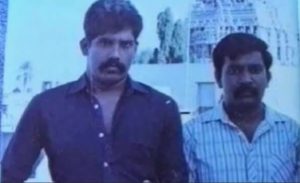
Seelan and Pirapaharan
Seelan, whose real name was Charles Lucas Anthony, was a relative newcomer. He joined the LTTE in 1979, barely two years before. His courage and total loyalty to Pirapaharan and dedication to the Tamil struggle had won for him this major assignment.
Seelan was born into a poor Roman Catholic family maintained by his mother, who worked as a domestic help at a medical officer’s house, as his father, an alcoholic, had neglected his family responsibilities. Though brilliant in his studies, Seelan and his sister had only water to drink when they returned home from school. He was once thrashed by the police for burning the Sri Lankan national flag.
For nearly two years after his return from Tamil Nadu Seelan kept the army and the police on their toes. They dreaded him and, when his body was identified as one of those who died in the Meesalai encounter in 1983, the army threw a party at Gurunagar Camp to celebrate it.
Seelan, who had taken part in the Neerveli Bank robbery before he fled with Pirapaharan to Tamil Nadu, kept track of the army vehicles once he was back. He noticed their pattern. Daily, a jeep belonging to the Engineer Services of the Sri Lanka Army left Palaly in the morning and traveled to Jaffna city to buy construction material. Its usual halt was at the Jaffna branch of the Building Materials Corporation on the KKS road. The jeep arrived around 10.30 a.m. on October 15 and the procuring officer, an army sergeant, went into the shop with his escort. Lance Corporal Hewawasam was in the driver’s seat relaxing with his head on the steering wheel. Private Tissera of the Pioneer Corps had got down from the jeep and was waiting near the rear. He had kept the .303 rifle he carried inside the jeep.
Seelan was waiting for just that. Seelan and three of his friends rode on two bicycles from behind. As the bicycles slowed down, Seelan and another jumped down from the pillion and shot dead Tissera and Hewawasam at point blank range, removed the gun from the vehicle and rode away on their bicycles.
Jaffna businessmen, now used to the pattern of retaliatory attacks the police and the army indulges in, closed their shops and vanished. Transport ground to a halt and the town was deserted. That did not prevent the army from their retaliatory attack. Shops were looted and burnt, houses around the scene of the incident attacked and civilians thrashed severely.
The government was upset. The belief that Tamil militants attacked only the demoralized police was shattered. They had now taken on the army. The government received an additional shock eight days later. Not to be outdone by the LTTE’s feat, PLOTE robbed the Kilinochchi People’s Bank branch on 23 October. In a well-planned operation, they killed Corporal Wijeweera of the “Gemunu Watch.” The army unit stationed at the Buddhist temple opposite the bank could not do anything to prevent the robbery. They fired, but PLOTE cadres escaped with the massive haul of gold worth 27 million rupees. Banks closed their rural branches after that and opened the regional offices for restricted hours.

PLOTE flag
The Kilinochchi bank robbery was the last major deed by the PLOTE. It ran into difficulty thereafter. Its livewire, Sundaram, was shot dead on 2 January 1982 while he was inside the Chitra Press in the Jaffna town editing the magazine “Puthiya Pathai” (New Path), a publication highly critical of the TULF and the LTTE. Sundaram, a young and energetic Marxist, threw himself on Uma’s side during the split in the LTTE. Police investigators said Seelan shot him from outside the press through an open window.
That was what they call in military parlance an opportunity target. Sergeant Appuhamy of the Armoured Corps, wanted to take his family to Nagadeepa. He had been provided a jeep with an escort. They went in the jeep to Kurikadduwan jetty, from where they took the boat. The driver of the jeep parked the vehicle near a tea boutique and slept in his seat resting his head on the steering wheel. The two soldiers who provided the escort kept their weapons inside the jeep and stood a little distance away. Karthan and his group, who happened to be there shot, the driver and removed two Self Loading Rifles, one Sub Machine Gun and ammunition. The two soldiers jumped into the lagoon and swam to safety.Following the Kilinochchi bank robbery, the Police and the Army widened their search operations to the Kilinochchi and Vavuniya districts in the mainland and an operation was conducted in the Gandhyam Farms there on 27 January 1982. By the end of January, a number of PLOTE cadres including Sivam, Mariyanayagam, Gnasekaram, Tractor Sri, Banker, Ganeshalingam, Robert, Farooq and Udaya Kumar were arrested. That did not silence the PLOTE. On 13 February 1982, a group of PLOTE cadres led by Karthan killed Abeyratne Banda of the Armoured Corps at the Kurikadduwan Jetty on Punkudutheevu Island.
Unable to withstand the police and military pressure Uma Maheswaran, Kannan (Somasundaram Jotheeswaran), Kakka (Thurairajah Sivaneswaran), Anton (Sivanayagam Anbalagan) and Thasan left for Tamil Nadu by boat on 25 February 1982. The Navy arrested Anton on his return after dropping the others. He told investigators that Uma took with him 20 packets of gold looted from the Kilinochchi bank. They also carried with them one Sub Machine Gun and three .38 revolvers. Three days after Uma’s escape army officers from Gurunagar camp raided the PLOTE camp in Vavuniya and killed Karthan after a shootout. A large stock of arms and ammunition, including the two Self- Loading Rifles Karthan had taken away at Kurikadduwan, were captured.
Trap Well Laid
While all this was happening on the militant front, President Jayewardene, with the help of Wilson, laid a trap for the TULF.
Wilson had suggested, soon after the passage of the DDC, the formation of a High Level Committee comprising senior ministers and TULF leaders to sort out problems arising during its implementation. Jayewardene had dismissed the idea, saying that his ministers would oppose it.
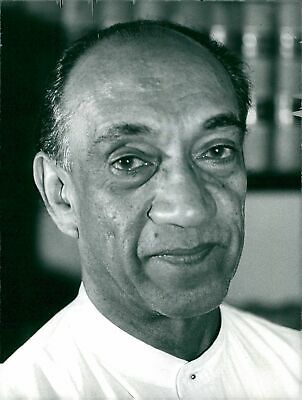
JR Jayawardene
Immediately after the August riots Jayewardene telephoned Wilson, who had gone back to Canada, and asked him to return to Colombo as he had decided to establish the High Level Committee Wilson had suggested. Jayawardene said he would appoint it even if the entire cabinet opposed it because he believed that could end the feuding between the Sinhalese and the Tamils. He said he wanted the discussions to start immediately.
Amirthalingam. Sivasithamparam and Sampanthan met Jayewardene a few days later at the President’s House.
Ministers Athulathmudali, Thondaman, Nissanka Wijeyaratne, Ranil Wickremesinghe and M. H. Mohamed were present.
Wilson participated in his capacity of Presidential Advisor.
An official statement was issued on 31 August after three rounds of talks. It read:
The leaders of the United National Party and the Tamil United Liberation Front, who met under the chairmanship of His Excellency the President, discussed the unfortunate loss of life and damage to property in various parts of the country during the last few months and agreed, in order to end racial tension, to restore peace and harmony:
1. To constitute a high level committee under the chairmanship of His Excellency the President. The committee will, in addition, comprise the prime minister, Ministers and the Leaders of the TULF. The committee will discuss all questions in dispute with a view of their peaceful resolution.
2. Persuade all political parties to cooperate and contribute to end all forms of violence, throughout the country.
3. In addition to other measures, lend their efforts towards the proper and satisfactory working of the District Development Councils.
Signed: J R Jeyawardene,
President of Sri Lanka,
31. 8. 1981.
At the fourth round of talks held on 13 September Jayewardene announced the appointment of a committee to look into the four demands the TULF had placed before the committee. The four demands of the TULF were:
A) Action to be taken against the police officers responsible for violent incidents in Jaffna;
B) Payment of compensation to affected people;
C) Increasing the number of Tamil policemen in the North and East, and;
D) Appointment of home guards to prevent the recurrence of violence.
Pleased with this advance Amirthalingam told the media: “The TULF is prepared to go half way,” and called off its 3-month boycott of Parliament announced after the burning of the Jaffna Public Library.
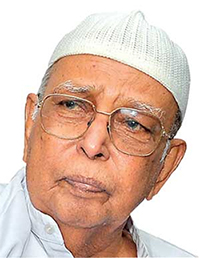
Minister M. H. Mohamed
Amirthalingam was summoned by Jayewardene on 27 October, in the aftermath of the attack on the army and the Kilinochchi bank robbery. He was told that the purpose of the meeting was to discuss ways and means to prevent retaliatory attacks by the army and the police on civilians and their property. Service commanders who were present told the TULF leaders that strict instructions had been given to their ranks not to harm civilians or damage their property. TULF leaders responded by assuring Jayewardene they or the Tamil people did not condone criminal attacks on officers engaged
The TULF honoured their undertaking by issuing a statement signed by Amirthalingam and Sivasithamparam. It said:
“There is absolutely no excuse for these murders… we are positive that the acts of violence will not advance the cause of the Tamil people in any way. On the contrary, they will only help destroy the sympathy for the sufferings of the Tamil people.”
Jayewardene, who was trying his best to drive a wedge between the TULF and the militants, had at last succeeded.
He got Mathew to attack the TULF for this very purpose. Mathew’s main charge against the TULF was that it was the brain behind the militant groups and it actively assisted them. The charge was mainly focused against Amirthalingam and Yogeswaran.
Mathew kept pressing the TULF to condemn the attacks on the police. TULF had now done that.
An elated Jayewardene proposed through Wilson to Amirthalingam they should regularize the top level meeting and suggested that they hold it every month. Amirthalingam readily agreed. Jayewardene’s confidante and Minister of State Anandatissa de Alwis took the move further to seal the TULF – militants cleavage. He organized a series of “Meetings of Moderates,” saying understanding among the Sinhala and Tamil moderates should be promoted and extremists edged out of the national scene. The agenda set for their discussion was peace, harmony, law and order. The purpose of these meetings, de Alwis explained, was to bring people together and create opinion against violence, terrorism, racial and religious conflicts. Militants saw in the meetings a crafty attempt to isolate them from the Tamil public.
Monthly Inter- Party Talks began in November 1981 and Amirthalingam provided Jayewardene with memos indicating the topics he wanted to raise before each meeting so that the President could get the concerned ministers to attend the meeting. At these meetings the President was very courteous and the ministers cooperative. The ministers readily agreed to attend to the matters raised by the TULF.
The TULF again honoured its undertaking by condemning the Kurikadduwan Jetty shooting of 13 February 1982. The statement said: “The TULF has never since its founding condoned any form of violence in whatever form and expresses its deep sympathies to the families of the victim.”
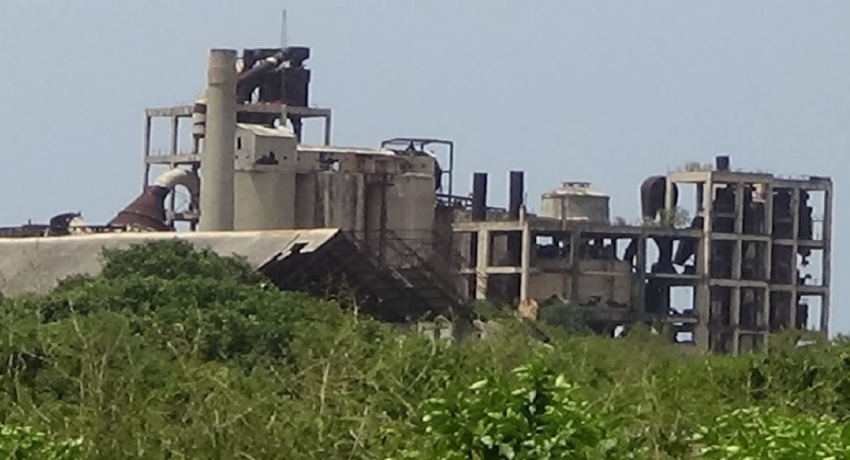
KKS Cement Factory 2015
Mathew welcomed the statement. He decided to welcome the TULF statement from Kankesanthurai while on his visit to the Cement Factory. I was present at the meeting. I was in the group of journalists Mathew took with him in his flight to Kankesanthurai. After the statement, he called me and asked me to tell my editor to give maximum publicity to his
statement stressing the fact that it was made from the Jaffna soil. His intention was to make the militants get annoyed
with the TULF.
And it happened. Militant groups, PLOTE in particular, were angry. The newly formed Tamil Eelam Liberation Front (TELF) plastered Jaffna’s walls with the slogan: JR’s TULF turns against freedom struggle.
The TULF honoured its second undertaking- to cooperate with the government to conduct its parliamentary affairs- given to Jayewardene by attending the 29 April 1982 ceremonial opening of the new parliamentary complex at Sri
Jayawardhenapura, Kotte. The TULF did that defying the advice of the militant groups and the vociferous TELF.
Amirthalingam made a classic speech. He traced the history of the Tamils, how successive governments had let them down after entering into pious agreements, how the Tamil homeland had been gradually colonized by the Sinhala people, how they were being reduced to second class status, how they had been made insecure in their homeland and how that led the youth to revolt. He concluded the speech by affirming their faith in the honesty, fairness and justice of President Jayewardene.
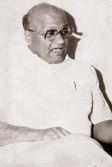
A Amirthalingam
Since I was not covering parliament during that period I could not attend the ceremonial opening. I telephoned to congratulate Amirthalingam after reading his speech and he responded: “Many people have congratulated me. They said I have done the right thing in making use of that historic opportunity to tell the country and the world the problems and frustrations of the Tamil people. They said the youths were wrong in advising me to boycott the ceremony. We are using parliament as the platform for our propaganda. The youths don’t seem to understand that.”
Not only the youths, even the Tamil public was turning against the TULF strategy. The feeling that the TULF leaders were ditching their mandate for the sake of enjoying the comforts and perks of office was growing. That was reflected in the success of the hartal the TELF and a handful of small groups like the Eelam Manavar Pothu Manram, the Students Association of the University of Jaffna, the Tamil Youth League, and the Revolutionary Communist League staged on 29 April 1982, the day the new parliamentary complex was ceremonially opened.
Most of the shops in Jaffna were closed, cinema theatres cancelled their shows, transport grounded to a halt, schools recorded poor attendance and Jaffna wore a deserted look.
In May, when Amirthalingam visited Jaffna he was mobbed by thousands of demonstrating students shouting slogans denouncing him and the TULF. They were angry that their fellow students had been arrested by the police while Amirthalingam and his men were parleying with Jayewardene, enjoying short eats and the hot tea he served.
Amirthalingam was called a traitor. From thalapathy (commander) he had now become thuroki (traitor). The decline of Amirthalingam and the TULF had set in. Jayewardene’s strategy had succeeded. He had cut the ground from under Amirthalingam’s feet.
Breach and Betrayal
Eleven months of talks with Jayewardene produced very little. The talks helped the TULF to obtain relief for Tamil
government servants affected by the riots of 1977 and 1981, they helped the TULF to get Tamil policemen transferred to the North and East, they helped the TULF to stop the government’s attempts to alter the boundaries of Vavuniya district, but they failed to get the government to devolve to the DDCs the agreed upon powers or to provide them sufficient funds.
In the core areas of the implementation of the constitutional provisions concerning the Tamil Language, land use and land settlement, and law and order powers were not devolved at all.
Amirthalingam complained to the President several times about the failure of the government to implement the
constitutional provisions incorporated into the 1978 constitution. In one of his letters Amirthalingam wrote:
“Your government included certain rights of the Tamil language in the 1978 constitution. The government has failed to implement the Tamil language provisions and your ministers are busy finding excuses for their non-implementation. Even elementary rights like correspondence in Tamil are not observed. Can anyone blame the Tamil people, who have been struggling for their language rights for many years, if they refuse to be satisfied with mere paper rights for their language?”
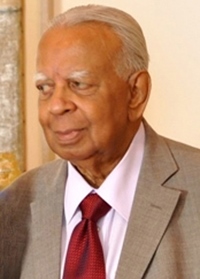
R Sampanthan 2013
Similarly, the power involving land use and land settlement, one of the core elements included in the District Development Council Law of 1980 was not devolved. In a letter he wrote to Jayewardene in June 1983 R. Sampanthan complained:
“The government in 1980 introduced the Development Councils Law. Land use and land settlement was one of the functions entrusted to the Development Councils… This law has not been implemented. Now, two years later, the law is virtually a dead letter. The law does not ensure non-interference by government or the Lands Ministry. Circulars issued by Lands Ministry officials clearly indicate that the government does not intend parting with the powers of land alienation.”
Similar was the situation concerning law and order. Agreed powers of control over the police were not devolved. Police and the army were used in the guise of curtailing terrorism to attack innocent people and their property.
The Jayewardene government, which failed to honour its constitutional and legislative obligations, also ignored the agreements it reached during the High Level Committee meetings and the settlements reached in the Inter-Party (UNPTULF)
Talks held monthly for eleven months in 1981/2.
In a hard hitting letter titled “A Sordid Saga-Breach of Faith and Betrayal” addressed to President Jayewardene and written on 10 August 1983, six days after the Sixth Amendment to the Constitution was enacted, Amirthalingam recounted some of the main agreements the government had failed to implement.
That portion of the letter reads:
“Whenever we were invited for discussions with the government, even when the Tamil people had been victims of violence, instigated by your party-men as in 1981, we responded and participated. Whatever the TULF agreed to do was unfailingly carried out by us. We cannot be blamed for certain happenings which were beyond our control. We are not the government responsible for law and order in our areas. But can Your Excellency say that the government has carried out the matters it agreed to do in the Inter- Party Talks that went on for eleven months? I may mention some of the matters:
District Development Councils – nothing done to make them effective as agreed.
Posting a majority of Tamil-speaking policemen in Tamil areas – Carried out in Jaffna district but not done in any of the other Tamil districts as promised. Most of the trouble we had in Trincomalee and Vavuniya in June and July could have been avoided if this was implemented. Recruitment of more Tamils into the Police and the armed forces so as to make these services function in a non-partisan way in times of ethnic tension- This promise has not been fulfilled by the government.
Compensation for victims of police violence in 1981 May-June has been only partially paid. It had not been paid to victims in Chunnakam and Kankesanthurai as agreed. Only two million out of the ten million rupees awarded by the Lionel Fernando Commission to the burnt Jaffna Public Library has been paid from the President’s Fund. Though prosecutions were initiated against some of the policemen responsible for killing and arson in Chunnakam and Kankesanthurai in MayJune 1981 none of them were arrested and produced at the Mallakam Magistrate’s Court and now the cases have been transferred to Colombo where the victims dare not appear and testify.
Home-guards were not established as promised even after the names were sent up and cleared by the police.
“Agreements reached about the Pankuddah Housing Scheme and the Kalviyabkadu village in the Batticoloa district have not been implemented to date.
“The government has not removed the illegally erected Buddha statue at Vavuniya junction though Your Excellency gave the order to remove it at the very first meeting of the High Level Committee in August 1981. If the government is so absolutely powerless in removing an irritant to the Tamil people illegally erected by certain Sinhala Public Servants, can the Tamil people expect justice where Sinhala chauvinism dictates otherwise?
“The promises the government made with regard to employments in the public sector were not kept. The circulars issued and countermanded by the Secretary to the Ministry of Plan Implementation regarding employment in the Tamil districts are too sordid to be discussed at length here.
“The agreement to limit the Executive Committees in Mannar, Vavuniya and Mullaitivu to three members so as not to make the majority in these DDCs a minority in the Executive Committees and the subsequent appointment of a UNP member to the Executive Committee in Vavuniya, the resignation of this member when the failure to comply with the law was pointed out and the later nomination of the same man again are good examples of the way the government promises are kept.
“I mentioned above a few of the matters which were agreed at the Inter-Party Talks in order to show why we regard bilateral talks between the TULF and the government as a futile exercise.”
The failure to implement the constitutional provisions concerning the rights of the Tamil people, the failure to devolve the core subjects mentioned in the District Development Council Law and the failure to honour agreements reached during bilateral talks were not the only problems the moderate Tamil leadership faced. As Wilson, who monitored the devolution process, remarked: “Ministers and bureaucrats were cheeseparing in divesting themselves of the powers agreed upon.” He adds: “There should have been some uniformity. Each minister devolved certain powers different from their colleagues. But the rub was that they were unwilling to part with the finances they controlled in relation to the subjects they devolved.”
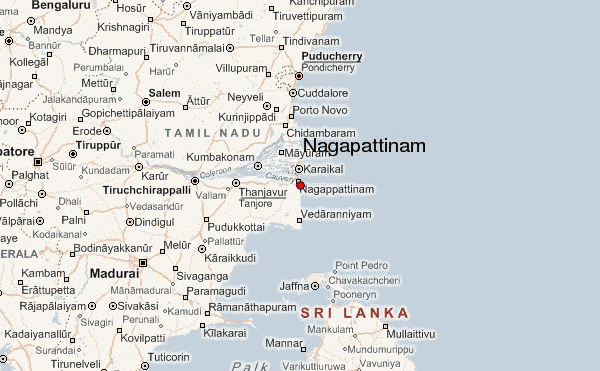 The DDCs were frustrated to find that they had no money to make use of the powers they had been given. They found that in practice the government was using every hidden mechanism to maintain its hold on the people living in the districts. The Jaffna DDC under its chairman, Nadarajah, decided on two projects to raise the money it required. The first was to run a shipping service from Kankesanthurai harbour to Nagapatinam in India, which a fesibility study showed would be a money spinner. The second was to levy a tax of one rupee on every packet of cement manufactured at the Kankesanthurai Cement Factory. The government ruled out both projects. The DDC was thus left with a small budget provided by the government.
The DDCs were frustrated to find that they had no money to make use of the powers they had been given. They found that in practice the government was using every hidden mechanism to maintain its hold on the people living in the districts. The Jaffna DDC under its chairman, Nadarajah, decided on two projects to raise the money it required. The first was to run a shipping service from Kankesanthurai harbour to Nagapatinam in India, which a fesibility study showed would be a money spinner. The second was to levy a tax of one rupee on every packet of cement manufactured at the Kankesanthurai Cement Factory. The government ruled out both projects. The DDC was thus left with a small budget provided by the government.
Nadarajah protested by resigning his post of chairman in July 1983. President Jayewardene invited him for a meeting and before anything could happen, riots broke out and the DDC scheme was abandoned.
A year earlier, in April 1982, when Jayewardene got down Wilson from Canada and asked him to arrange a meeting with the TULF to discuss the problems of implementing the DDC scheme, he told Wilson he was overwhelmed by his anti-Tamils ministers. Wilson, in his Lanka Guardian (15 March 1995) article writes of what Jayawardene told him:
“I am circled by my communal-minded ministers. If you can help me to jump out of this circle by talking to your TULF friends I might be able to do something.”
And Wilson talked to Amirthalingam. At the meeting, Jayewardene told Amirthalingam that he needed the Tamil votes for the presidential election and added that he could not say that in public because he would lose Buddhist support.
“I would definitely make the DDCs work once I win the election.”
Amirthalingam fell flat into the JR trap.
Next: Chapter 27. Amir Taken For A Ride
To be posted January 21